Wild, Wonderful and Worldwide
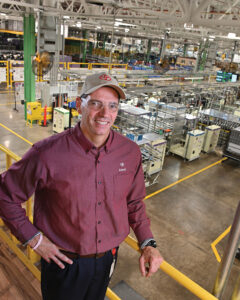
A new chapter is being written in West Virginia’s economic history, one marked by a growing influx of international investment. International investment is creating jobs, fostering innovation and reshaping the Mountain State’s economy, said West Virginia Department of Economic Development Secretary Mitch Carmichael.
Any definition of a good economy would include a variety of industries, with great opportunities in all segments,” Carmichael said. “We want to grow and expand the economic base for the entire state. That means there’s great space for international companies that want to employ West Virginians, provide good jobs and supply products and services that America wants and needs.”
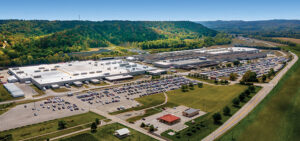
He said international companies are attracted to West Virginia for a multitude of reasons — open regulatory environments, tax structures that are easy to work with, low crime rates, a low cost of living, a high quality of life — but the people are the reason they stay.
“International companies are continually impressed by the quality of our applicants and the dedication of our workforce,” Carmichael said. “The loyalty of our workforce begins to shine through as soon as these companies locate in our state. They feel it; they see it; and it transcends to their bottom line.”
That certainly has been the case for Toyota West Virginia, which established its manufacturing facility in Buffalo in 1996 and remains the state’s largest international investment to date. The Japanese auto manufacturer has expanded its West Virginia plant 11 times, increasing its initial $400 million investment to almost $2 billion. The plant recently began production on the fifth-generation hybrid transaxle — a move that places West Virginia at the forefront of Toyota’s global electrification efforts, said Toyota West Virginia President David Rosier.
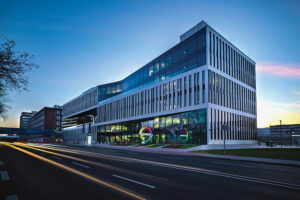
“We remain competitive because of the people who work at Toyota West Virginia,” Rosier said. “Our team is not afraid of a challenge, and they are committed to excellence. Their work ethic reinforces Toyota’s faith in the Mountain State and helps us ensure long-term employment stability.”
Rosier started his career with Toyota West Virginia in the early 2000s, working his way into various leadership positions. He spent nearly 16 years at the facility before transitioning to Toyota Kentucky to lead its drivetrain plant. In 2022, he was named plant president of Toyota West Virginia.
“I like to say that country roads brought me home,” Rosier said.
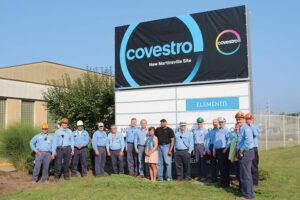
With community involvement that ranges from partnering with local schools to donating millions of dollars to area nonprofits, Toyota is a prime example of the type of international investment West Virginia aims to attract, Carmichael said.
“We are very intent on attracting quality companies — great corporate citizens who provide good wages and treat their employees well, who add to the diversity and the mix of our culture in our state,” he said.
But recruiting quality companies doesn’t happen overnight. Companies like Germany-based Covestro, France-based Constellium and South Korea-based LG NOVA — all significant contributors to West Virginia’s economy — consider a range of factors when deciding whether to invest in West Virginia. That’s where the Department of Economic Development’s International Division comes in.
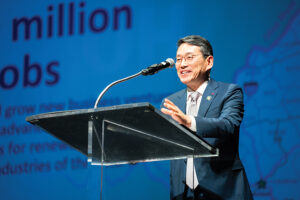
Led by Steve Spence, who has spent over four decades cultivating international partnerships in West Virginia, the International Division works to assist companies from around the world in establishing manufacturing, distribution and service facilities in the state. Recent announcements include Japan-based SOMAR, whose Wood County facility will manufacture an epoxy resin product used in the automotive sector, and India-based TCL Specialties, which is establishing two manufacturing facilities in Marshall County: one to make food ingredients and the other to make maleic anhydride, an ingredient used in reinforced polymers and other applications.
“When you consider what the significance is to West Virginia, one, it’s helping diversify our economy,” said Spence. “We’re attracting companies in automotive, aerospace, building materials, chemicals, metals and other sectors. That’s a big plus. Second, these are quality jobs, with good pay and good benefits. That’s why we’re doing what we’re doing.”
Today, West Virginia’s international investment includes 146 companies from 32 countries, providing 30,000 jobs to West Virginians. Spence credits his staff, whose responsibilities include conducting market research, attending trade shows both domestically and abroad and working directly with companies all over the world to showcase West Virginia’s potential. The division has two offices in Asia, which are managed by Hollie Hubbert; its European office is managed by Angela Mascia.
“It’s not a one-shot deal; you have to have those long-term relationships and long-term marketing efforts,” Spence explained. “West Virginia isn’t the first place a company in another country is going to think of when they’re considering locating in the U.S. — we have to market the state. We’ve been very fortunate in West Virginia that our state leaders recognize the importance of that.”
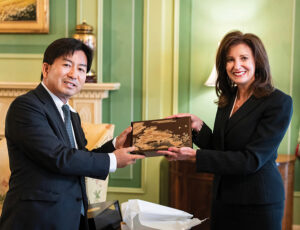
For the past 12 years, the United States has been the world’s top destination for foreign investment, he added.
“These European companies, South American companies, Asian companies — they’re investing in the United States more than in any other country,” he said.
West Virginia’s leading sources of foreign investment are Japan, Canada and France. Japan alone makes up a total investment of $3.1 billion. Spence said drastic improvements in the state’s business climate have made West Virginia an attractive destination for foreign investors.
“The overall cost of doing business is key to any project,” he said. “These are private companies; they want to make a profit. The reason we have been successful in attracting foreign investment is because we’ve had leadership through the years — governors, legislative leaders, the West Virginia Chamber of Commerce, the West Virginia Manufacturers Association — who’ve pushed to make our state more business-friendly.”
He said companies also find West Virginia’s location appealing, particularly its proximity to key population centers. But there’s another advantage that, though less tangible, is no less important.
“Many of these companies are smaller, family-owned companies, where this is their first facility in the United States — sometimes their first outside their own country,” Spence said. “Our staff assists them in everything from getting their children enrolled in schools to buying a car to opening a checking account. That’s something we can offer here. In a larger metropolitan area, they’d be on their own.”
West Virginia also offers “short ladders to decision-makers,” he said, a benefit that lasts long after the initial investment is secured. The International Division team remains in contact with companies for years, even decades, after companies establish operations in the state.
“They know and we know that once they announce an investment, that’s not the end of it,” he said. “If they have issues that come up or need to talk to someone about taxes or highways or anything related to doing business in this state, they know they can get help. There’s not a big bureaucracy here. And they appreciate that strong personal support.”
